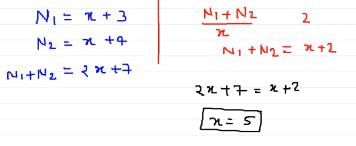Railways Exam > Railways Questions > If two numbers are each divided by the same d...
Start Learning for Free
If two numbers are each divided by the same divisor, the remainders are respectively 3 and 4. If the sum of the two numbers be divided by the same divisor, the remainder is 2. The divisor is
- a)9
- b)7
- c)5
- d)3
- e)None of these
Correct answer is option 'C'. Can you explain this answer?
Most Upvoted Answer
If two numbers are each divided by the same divisor, the remainders ar...

Free Test
FREE
| Start Free Test |
Community Answer
If two numbers are each divided by the same divisor, the remainders ar...
To solve this problem, we need to use the concept of modular arithmetic. Modular arithmetic deals with the remainder when a number is divided by another number, called the modulus.
Let's assume the two numbers are x and y, and the divisor is d.
The given conditions can be represented as:
x ≡ 3 (mod d) -- (1)
y ≡ 4 (mod d) -- (2)
(x + y) ≡ 2 (mod d) -- (3)
To find the value of the divisor, we need to consider the possible values of d.
1. Divisor as 3:
If d = 3, then the possible remainders when divided by 3 are 0, 1, and 2. However, the remainders given in the problem are 3 and 4, which are not possible when divided by 3. Therefore, we can rule out the divisor as 3.
2. Divisor as 7:
If d = 7, then the possible remainders when divided by 7 are 0, 1, 2, 3, 4, 5, and 6. We can check if the given remainders satisfy the conditions.
From (1), x ≡ 3 (mod 7) implies x = 7a + 3 for some integer a.
From (2), y ≡ 4 (mod 7) implies y = 7b + 4 for some integer b.
Substituting these values in (3), we get:
(7a + 3 + 7b + 4) ≡ 2 (mod 7)
(7a + 7b + 7) ≡ 2 (mod 7)
7(a + b + 1) ≡ 2 (mod 7)
7(a + b + 1) = 7k + 2 for some integer k.
Since the left-hand side is divisible by 7, the right-hand side should also be divisible by 7, which is not possible for 7k + 2. Therefore, we can rule out the divisor as 7.
3. Divisor as 5:
If d = 5, then the possible remainders when divided by 5 are 0, 1, 2, 3, and 4. We can check if the given remainders satisfy the conditions.
From (1), x ≡ 3 (mod 5) implies x = 5a + 3 for some integer a.
From (2), y ≡ 4 (mod 5) implies y = 5b + 4 for some integer b.
Substituting these values in (3), we get:
(5a + 3 + 5b + 4) ≡ 2 (mod 5)
(5a + 5b + 7) ≡ 2 (mod 5)
5(a + b + 1) ≡ 2 (mod 5)
5(a + b + 1) = 5k + 2 for some integer k.
Since the left-hand side is divisible by 5, the right-hand side should also be divisible by 5. 5k + 2 satisfies this condition for certain values of k. Therefore, the divisor can be 5.
Hence,
Let's assume the two numbers are x and y, and the divisor is d.
The given conditions can be represented as:
x ≡ 3 (mod d) -- (1)
y ≡ 4 (mod d) -- (2)
(x + y) ≡ 2 (mod d) -- (3)
To find the value of the divisor, we need to consider the possible values of d.
1. Divisor as 3:
If d = 3, then the possible remainders when divided by 3 are 0, 1, and 2. However, the remainders given in the problem are 3 and 4, which are not possible when divided by 3. Therefore, we can rule out the divisor as 3.
2. Divisor as 7:
If d = 7, then the possible remainders when divided by 7 are 0, 1, 2, 3, 4, 5, and 6. We can check if the given remainders satisfy the conditions.
From (1), x ≡ 3 (mod 7) implies x = 7a + 3 for some integer a.
From (2), y ≡ 4 (mod 7) implies y = 7b + 4 for some integer b.
Substituting these values in (3), we get:
(7a + 3 + 7b + 4) ≡ 2 (mod 7)
(7a + 7b + 7) ≡ 2 (mod 7)
7(a + b + 1) ≡ 2 (mod 7)
7(a + b + 1) = 7k + 2 for some integer k.
Since the left-hand side is divisible by 7, the right-hand side should also be divisible by 7, which is not possible for 7k + 2. Therefore, we can rule out the divisor as 7.
3. Divisor as 5:
If d = 5, then the possible remainders when divided by 5 are 0, 1, 2, 3, and 4. We can check if the given remainders satisfy the conditions.
From (1), x ≡ 3 (mod 5) implies x = 5a + 3 for some integer a.
From (2), y ≡ 4 (mod 5) implies y = 5b + 4 for some integer b.
Substituting these values in (3), we get:
(5a + 3 + 5b + 4) ≡ 2 (mod 5)
(5a + 5b + 7) ≡ 2 (mod 5)
5(a + b + 1) ≡ 2 (mod 5)
5(a + b + 1) = 5k + 2 for some integer k.
Since the left-hand side is divisible by 5, the right-hand side should also be divisible by 5. 5k + 2 satisfies this condition for certain values of k. Therefore, the divisor can be 5.
Hence,

|
Explore Courses for Railways exam
|

|
Question Description
If two numbers are each divided by the same divisor, the remainders are respectively 3 and 4. If the sum of the two numbers be divided by the same divisor, the remainder is 2. The divisor isa)9b)7c)5d)3e)None of theseCorrect answer is option 'C'. Can you explain this answer? for Railways 2025 is part of Railways preparation. The Question and answers have been prepared according to the Railways exam syllabus. Information about If two numbers are each divided by the same divisor, the remainders are respectively 3 and 4. If the sum of the two numbers be divided by the same divisor, the remainder is 2. The divisor isa)9b)7c)5d)3e)None of theseCorrect answer is option 'C'. Can you explain this answer? covers all topics & solutions for Railways 2025 Exam. Find important definitions, questions, meanings, examples, exercises and tests below for If two numbers are each divided by the same divisor, the remainders are respectively 3 and 4. If the sum of the two numbers be divided by the same divisor, the remainder is 2. The divisor isa)9b)7c)5d)3e)None of theseCorrect answer is option 'C'. Can you explain this answer?.
If two numbers are each divided by the same divisor, the remainders are respectively 3 and 4. If the sum of the two numbers be divided by the same divisor, the remainder is 2. The divisor isa)9b)7c)5d)3e)None of theseCorrect answer is option 'C'. Can you explain this answer? for Railways 2025 is part of Railways preparation. The Question and answers have been prepared according to the Railways exam syllabus. Information about If two numbers are each divided by the same divisor, the remainders are respectively 3 and 4. If the sum of the two numbers be divided by the same divisor, the remainder is 2. The divisor isa)9b)7c)5d)3e)None of theseCorrect answer is option 'C'. Can you explain this answer? covers all topics & solutions for Railways 2025 Exam. Find important definitions, questions, meanings, examples, exercises and tests below for If two numbers are each divided by the same divisor, the remainders are respectively 3 and 4. If the sum of the two numbers be divided by the same divisor, the remainder is 2. The divisor isa)9b)7c)5d)3e)None of theseCorrect answer is option 'C'. Can you explain this answer?.
Solutions for If two numbers are each divided by the same divisor, the remainders are respectively 3 and 4. If the sum of the two numbers be divided by the same divisor, the remainder is 2. The divisor isa)9b)7c)5d)3e)None of theseCorrect answer is option 'C'. Can you explain this answer? in English & in Hindi are available as part of our courses for Railways.
Download more important topics, notes, lectures and mock test series for Railways Exam by signing up for free.
Here you can find the meaning of If two numbers are each divided by the same divisor, the remainders are respectively 3 and 4. If the sum of the two numbers be divided by the same divisor, the remainder is 2. The divisor isa)9b)7c)5d)3e)None of theseCorrect answer is option 'C'. Can you explain this answer? defined & explained in the simplest way possible. Besides giving the explanation of
If two numbers are each divided by the same divisor, the remainders are respectively 3 and 4. If the sum of the two numbers be divided by the same divisor, the remainder is 2. The divisor isa)9b)7c)5d)3e)None of theseCorrect answer is option 'C'. Can you explain this answer?, a detailed solution for If two numbers are each divided by the same divisor, the remainders are respectively 3 and 4. If the sum of the two numbers be divided by the same divisor, the remainder is 2. The divisor isa)9b)7c)5d)3e)None of theseCorrect answer is option 'C'. Can you explain this answer? has been provided alongside types of If two numbers are each divided by the same divisor, the remainders are respectively 3 and 4. If the sum of the two numbers be divided by the same divisor, the remainder is 2. The divisor isa)9b)7c)5d)3e)None of theseCorrect answer is option 'C'. Can you explain this answer? theory, EduRev gives you an
ample number of questions to practice If two numbers are each divided by the same divisor, the remainders are respectively 3 and 4. If the sum of the two numbers be divided by the same divisor, the remainder is 2. The divisor isa)9b)7c)5d)3e)None of theseCorrect answer is option 'C'. Can you explain this answer? tests, examples and also practice Railways tests.

|
Explore Courses for Railways exam
|

|
Signup for Free!
Signup to see your scores go up within 7 days! Learn & Practice with 1000+ FREE Notes, Videos & Tests.



















